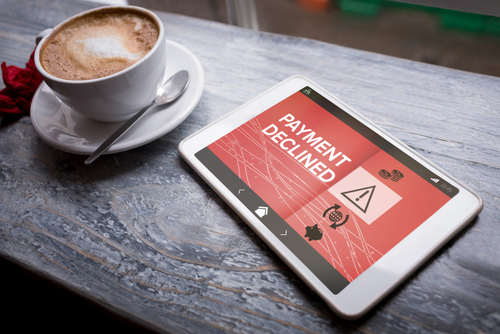Updated by 01.11.2025
Merchant Beware: Some Customer Card Payment Declines Cause Unexpected Holds
We’ve been noticing a conundrum among some of our client merchants at E-Complish.

What we’ve seen, and have also received calls about, concerns turning down (“declining”) an attempted payment via credit or debit card by a merchant’s customer. To be more specific, it concerns attempted card payments being declined because of either a mismatched billing address or a wrong CVC (card verification code).
Now of course, if a card gets denied for one of those reasons, to the merchant that’s just everyday business as usual (albeit a little frustrating, since no payment got received). Furthermore, it’s good business, because declining a card for a mismatched billing address or a wrongly entered CVC means good security measures are in place. Customers are being protected from potential fraud by hackers or card pickpockets.
So, what could be the problem here? The problem is that customers are getting angry at merchants because of some misinformation and insufficient understanding of how card payments work. While this isn’t the merchant’s fault, it is the merchant’s responsibility for maintaining customer loyalty to help inform the customer.
The trouble is, we have seen that the merchants themselves don’t have all of the right information.
You see, when a customer’s card gets declined for mismatched billing address information or wrong CVC, that customer’s card gets a hold placed on it for an average of three to seven days, depending on the policies and terms of the card issuer (Visa, MasterCard, Amex, etc.). We’ve noticed that many merchants don’t know this.
As you likely know, a “hold” gets placed on a card when an electronic conversation takes place between a merchant’s payment processing system and the customer’s card issuer to ensure that the customer’s account (be it what remains on a credit limit or what the balance is in a checking or savings account) is good to pay the amount due. A certain amount of money gets placed on “hold” from the customer’s account by the card issuer at that time, meaning that the customer temporarily has no access to that money (again, whether it’s a balance or a certain amount in a line of credit) until the hold gets released (which it typically does in just a matter of minutes or seconds once the due payment is processed).
Holds are most often used at gas stations and hotels or motels, so a lot of customers are somewhat familiar with them. However, holds still get confusing to them.
Merchants set the size of holds for particular transactions, but they don’t set the duration. The rationale behind holds is that they ensure that businesses actually get paid and that there isn’t a plague of chargebacks unleashed upon the economy. The confusion starts when customers wrongly believe that it’s the merchants who are holding their money, even when it’s an amount in excess of what they actually owe.
Adding to this confusion is misinformation that sometimes (and this is frustrating to the hilt) comes from banks or card issuers themselves. When receiving a customer call asking why his money has been put on hold, they’ll sometimes say, “The merchant is holding your money”.
Wrong! And if you’re a merchant reading this, you probably know that. You know that you don’t see one thin dime of that held-aside money. You only get the amount due to you, then the remainder gets released back to the account of the customer.
The thing is….you, as a merchant, need to know about holds on cards because you’re going to get phone calls. The people (your customers) calling you won’t be happy or pleased with your business. They may believe that you’re holding on to their money, preventing them from buying other stuff or paying other bills, when in reality you’re not.
They will say things like: “My payment didn’t even go through, which is embarrassing enough! But now, you’re holding my money, too?! What gives? Why are you even allowed to do this to me?”.
This brings us back to our original theme: whether you as a merchant realize it or not, AVS (address verification) failure or CVC failure by your customer results in a hold placed on that customer’s card.
When it comes down to AVS failure, the credit card owner may have recently moved and forgotten to update your company or his card issuer with his new address. He may be having a day of caffeine deprivation and brain fog, and stubbornly keeps entering his usual shipping address which is different from his billing address. When it comes to entering the wrong CVC, a card owner may be trying to enter his information from memory, and he memorized the wrong code.
Whatever the case may be, for you as a merchant, this is not simply a matter of a declined card. It’s also a customer service matter, because an irate customer may very well be calling your offices to inquire about it!
You want to openly advise your customers (preferably by way of your website) with the following wisdom when they experience a CVC or an AVS card denial:
Please be absolutely up-to-date with us and your card issuer about your billing address, especially just after you’ve moved. Discrepancies cause declined cards and hold on to some of your money.
Triple-check your memory about your CVC for times when your card isn’t handy. Discrepancies cause declined cards and hold on to some of your money.
No, our company isn’t holding your money from you. That’s the bank or card issuer, and it’s just temporary. Once the hold period ends, you get all of that money back (less any taken out to pay your due bill).
No, the hold is not a “penalty” for your card getting declined. It’s a security procedure.
Please call your bank or card issuer, instead of us, to ask about the card’s policy and terms regarding holds.
Schedule a consultation to learn the details about this matter and keep your customers updated, you as a merchant remain one step ahead in the game of maintaining customer loyalty. And, hey, your customers deserve to be informed and happy!

